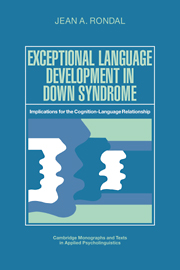 Exceptional Language Development in Down Syndrome
Exceptional Language Development in Down Syndrome Book contents
- Frontmatter
- Contents
- Foreword by Neil O'Connor
- Acknowledgments
- 1 Introduction
- 2 Language development in Down syndrome
- 3 Exceptional language development in mentally handicapped individuals
- 4 Cognition-language relationships and modularity issues
- 5 A case study
- 6 Theoretical discussion
- 7 General conclusions
- Appendixes
- References
- Index
5 - A case study
Published online by Cambridge University Press: 23 December 2009
- Frontmatter
- Contents
- Foreword by Neil O'Connor
- Acknowledgments
- 1 Introduction
- 2 Language development in Down syndrome
- 3 Exceptional language development in mentally handicapped individuals
- 4 Cognition-language relationships and modularity issues
- 5 A case study
- 6 Theoretical discussion
- 7 General conclusions
- Appendixes
- References
- Index
Summary
The subject
Framçoise was 32 to 36 years old during the time of the study. Her IQ and MA are supplied in Section 5.8. She was born on April 5, 1955, 3 weeks before term, weighing 2.750 kg. Delivery was relatively rapid and normal but for some degree of cyanosis due to the umbilical cord being wrapped around the neck. Additional oxygen was given on an intermittent basis for 24 hours following birth.
The Down syndrome condition was not diagnosed until Françoise was 3 years old, at which time the parents consulted at the Pediatric Clinic of the Liège University Hospital for her slow development and complete lack of speech. A karyotype was made at the time revealing a genotype 47, XX, + free 21 in each of the metaphases studied (standard trisomy 21). In the course of the present study, suspecting a possible subetiology of mosaicism, I requested a new karyotype. It was made in July 1988 and confirmed the first one.
The mother of Françoise was 35 years old at the time of birth, and the father 32. They already had two normal children, one boy and one girl, respectively aged 5 and 7 years. The socioeconomic level of the family is upper middle class. Françoise made her first attempts at walking unassisted around 2 years. She was toilet trained at 4 years. The parents did not report any sensory problem at the time, but no systematic examination of her visual and auditory acuity was made. The only word she was able to pronounce at 4 years was /to/ for couteau – knife. Little information is available on her language receptive ability at the time.
- Type
- Chapter
- Information
- Exceptional Language Development in Down SyndromeImplications for the Cognition-Language Relationship, pp. 70 - 209Publisher: Cambridge University PressPrint publication year: 1995
